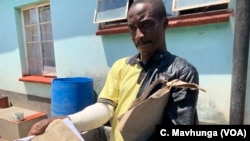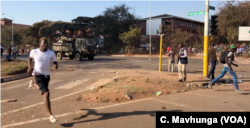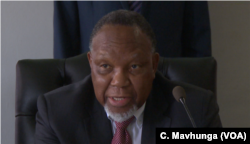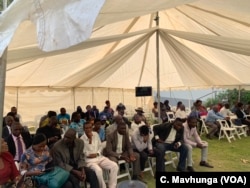In Zimbabwe, an inquiry is under way into what caused at least seven deaths during a post-election protest.
Adrian Munjere, 31, says he is lucky to be alive after a stray bullet from an assault rifle fractured his right hand.
Munjere told a commission on Zimbabwe's post-election violence that he witnessed troops firing live rounds to disperse opposition supporters during the Aug. 1 protest.
"I am bitter at the whole system," he told VOA after giving testimony. "I am looking forward to getting compensation because I feel like I cannot use this hand anymore to [do] anything manual or anything heavy. It is not like the compensation I want is going to cover for this damage — no. It is just so that I can sustain myself."
President Emmerson Mnangagwa appointed the independent commission, which is headed by former South African President Kgalema Motlanthe. The commission has three months to bring closure to the shootings, in which at least seven protesters were killed and dozens of people were injured.
Opposition protesters were in the streets Aug. 1, demanding the release of Zimbabwe's July presidential election results. The government says police were overwhelmed, so the army was called in. The army has been silent on who was responsible for the killings.
Mnangagwa was declared the winner two days later.
Jacob Mafume, spokesman for the opposition Movement for Democratic Change, says the commission is a charade.
"And for serious people to continue hearing testimony about how people demonstrated, and about how people expressed themselves, without dealing with the critical issue who asked for deployment, who gave live ammunition, and who gave the order to shoot, and who in particular shot, so that they can be interviewed to understand what was going through their mind, and what was their orders. It is a shame that President Motlanthe could lend his name to such a comical show," Mafume said.
But former South African President Motlanthe says he is hopeful some answers will come out of the commission.
"Our tasks will be to identify the actors — their leader's strategies and motives; to inquire into the intervention by the Zimbabwe Republic Police in the maintenance of law and order; to investigate circumstances which necessitated the involvement of the military in assisting in the maintenance of law and order; to consider whether the degree of force was appropriate in ensuring public safety, law and order," Motlanthe said.
It is not only Zimbabwe's opposition protesters who are seeking compensation from the commission.
A senior official from the ruling ZANU-PF party told the commission that opposition protesters set his $100,000 bus on fire because it was decorated with party logos.







